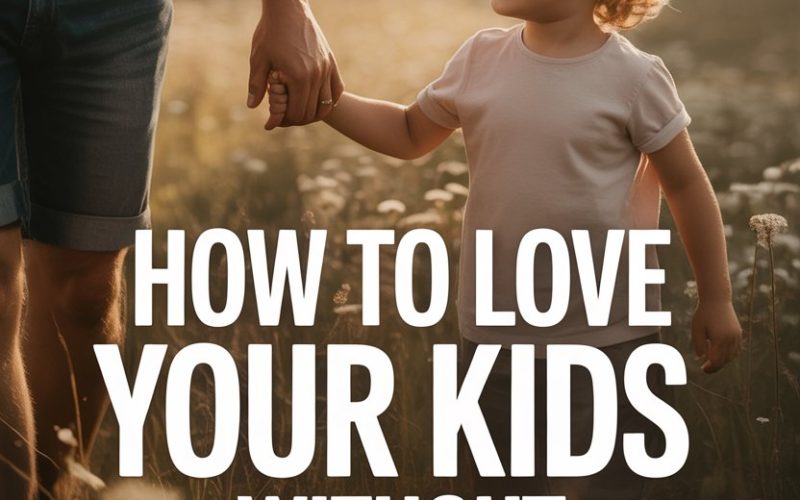Parenting sometimes feels like a bumper-car arena—with love as the pedal and worry as the steering wheel.
You want to keep them safe, but you don’t want to crowd out their chance to grow, trip, and, yes, even fail.
Here’s the trick: Show just enough love to fill their cup, not flood the kitchen.
What’s the Difference Between Loving and Smothering?
At its core, love gives kids a sense of security and belonging. Smothering, on the other hand, can block their independence and breed anxiety.
It’s the difference between offering an umbrella in a drizzle and duct-taping your kid to the sofa every time clouds roll in.
Children need to know you’re there, but not hovering with binoculars when they’re building Lego towers in the next room.
Research from the University of Virginia finds that overbearing parenting stunts both emotional and social growth. The trick is to strike that elusive balance.
Let’s untangle how.
Give Choices, Not Just Directions
Every parent has uttered the phrase, “Because I said so!” at least once (or, if you’re honest, 47 times today). Yet, offering choices can help kids learn decision-making and self-confidence.
Try framing your requests as options: “Would you like the red socks or the blue ones?” or “Should we read before or after your bath?”
This doesn’t mean handing over the reins completely. It’s about letting them steer within the boundaries you’ve set—sort of like those arcade games where the wheel is attached, but you still control the pedals.
Let Them Struggle (A Bit)
Watching your child wrestle with a tricky zipper or a math problem is harder than eating cold peas. Every instinct screams, “Let me do it for you!”
But here’s the kicker: Struggle is how kids learn persistence and pride in their accomplishments.
Step in only when your child truly needs help. If there are no tears or urgent safety concerns, hang back.
According to this Harvard study, kids who solve their own problems develop stronger executive function skills—fancy talk for the stuff that helps them manage life as grownups.
And when they do finally zip up that jacket solo? Applaud like they’ve just completed a space mission.
Keep Affection Consistent but Not Conditional
Saying “I love you” when your child scores a goal is great. Saying it when they miss is even better. Love should never feel like a reward for perfection.
Kids need to know your love is steady—rain or shine, trophy or tantrum.
Try hugs, notes in lunchboxes, or even a secret handshake. Physical affection and positive words foster security, not dependency, when given freely and not as a prize.
Learn When to Step Back
You’re not a helicopter, and your kids aren’t endangered baby eagles. If you find yourself micromanaging everything from shoelaces to science projects, it might be time for a breather.
Instead, stand nearby, offer encouragement, and resist the urge to “fix.” You can always ask, “Do you want help, or want to try on your own?”
This little sentence sneaks in support without swooping in like a superhero every time there’s a wobble.
Say Yes to Safe Risks
Children need to test limits—climbing trees, walking to the shop, baking biscuits (with supervision, lest the oven become a science experiment).
Saying “no” to everything, out of fear, can squash curiosity and self-reliance.
Set ground rules for safety, then allow your child to explore within them.
It’s a bit like teaching them to ride a bike: you steady them, but eventually let go. Sometimes they’ll wobble. Sometimes they’ll fall. But they’ll never learn with you hanging onto the seat forever.
Listen More, Solve Less
Sometimes all a child wants is to be heard, not fixed.
If your five-year-old laments about a playground spat, hold back on phoning the headteacher. Empathise, ask questions, and let your child know it’s okay to feel upset.
Active listening—nodding, making eye contact, and repeating back what you hear—teaches emotional intelligence.
The American Academy of Pediatrics recommends this approach for building trust and resilience in children.
Try: “That sounds really tough. What do you think you might do about it?” Suddenly, you’re not the fixer, but the coach cheering from the sidelines.
Respect Their Privacy (Even When You’re Dying to Know)
You may long to know every minute detail of your child’s life—who’s in their group chat, what they whispered to their mate at lunchtime, why their socks are always missing one of each pair.
But kids, especially as they approach double digits, need space.
Allowing for private time, independent play, and closed doors (occasionally, not always) signals trust.
If you’re worried, ask open questions: “Anything on your mind?” instead of “Tell me exactly what happened on the playground at 12:14pm.”
Model Self-Care and Boundaries
If you’re always sacrificing your own needs, kids take note. They might grow up believing parents don’t have friends, hobbies, or hot meals.
Show your children that you value your own boundaries. Tell them when you need a cuppa in peace, or when you’re going for a walk.
When parents practice self-care, children learn to respect both others’ limits and their own. The Child Mind Institute highlights this monkey-see-monkey-do effect.
Let Them Fail (Without Throwing Them to the Wolves)
Allowing kids to make mistakes—forgetting their gym kit, not finishing a project on time, picking the wrong snack—teaches natural consequences.
This isn’t about tossing them to the wolves. It’s about standing nearby with a metaphorical first-aid kit.
When things go pear-shaped, help them reflect without shaming. “What could we try next time?” instead of “I told you so.”
The trick is to treat mistakes as part of the process, not the end of the world.
Encourage Friendships and Interests Outside the Family
It’s tempting to be your child’s favourite playmate, confidante, and event planner. But they need connections outside your four walls.
Encourage sleepovers, team sports, music lessons, or whatever lights their spark. Let them build their own stories and skills, even if it means sitting through a school play where your child’s only line is “hello.”
Friendships and outside interests build independence and resilience.
Balance Is the Secret Ingredient
Kids want to know you’ll catch them if they fall—but they also want to stretch their wings. The best kind of love is the kind that lets them grow.
Finding that sweet spot means constant tweaking.
Some days, you’ll nail it. Other days, you’ll realise you’ve turned into a hover-parent who needs to step back. That’s okay.
Love and independence aren’t opposites; they’re dance partners. If you stumble a little, just pick up the beat and try again tomorrow.
The goal isn’t perfection—it’s connection. And a little breathing room for everyone.




